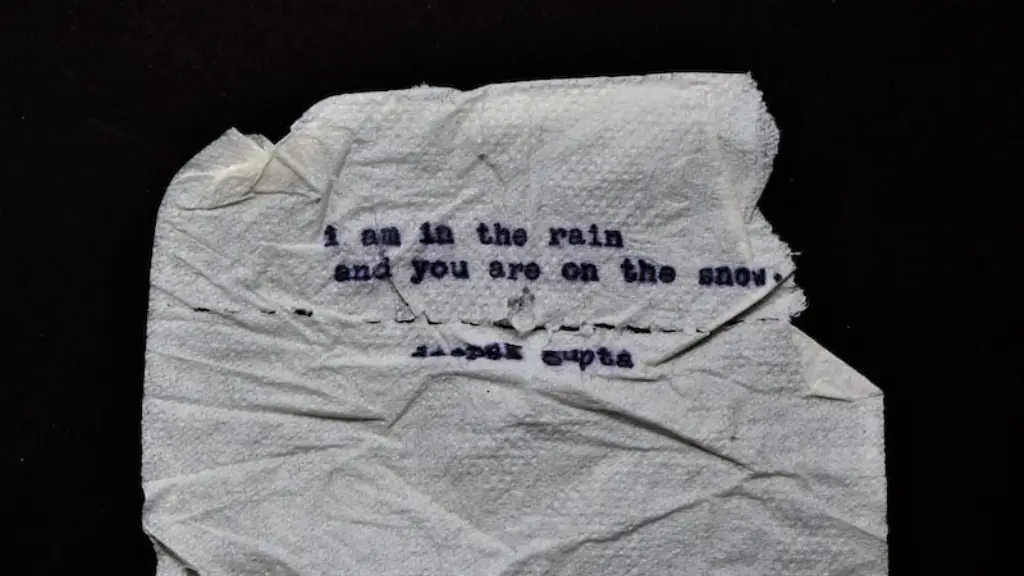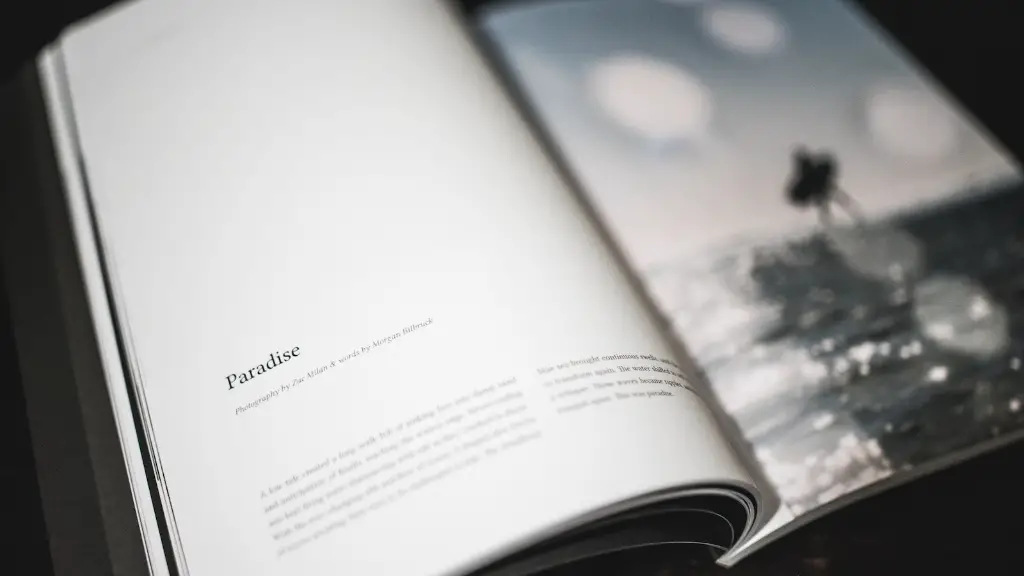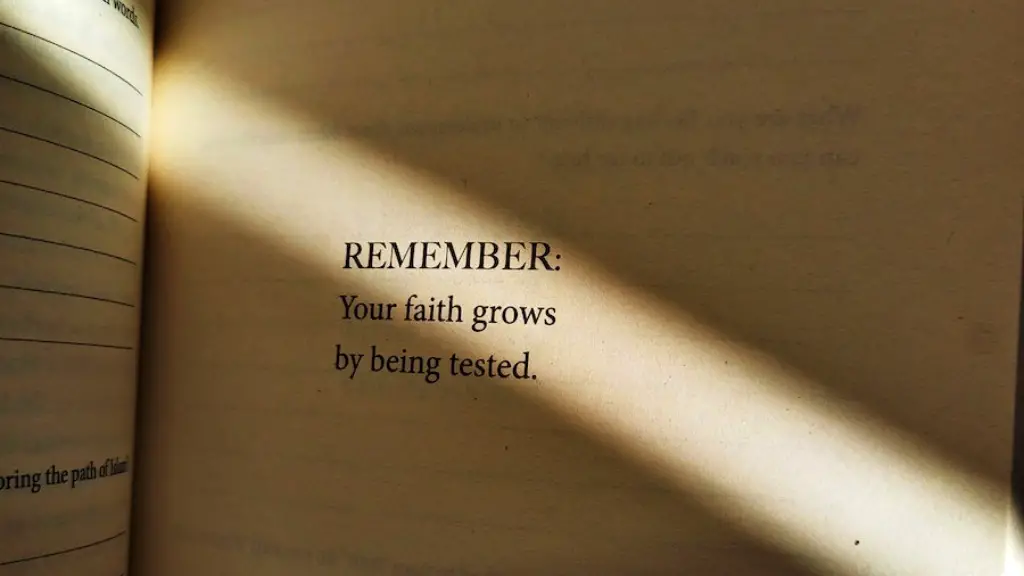Definition of Abstract Poetry
Abstract poetry is a style of verse which is experimental and abstract, often departing from the conventions of and definitions of traditional poetic forms. It makes use of fleeting and intangible concepts and the means of expression are often loose and open to interpretation. Generally, it is deemed a more cerebral style of poetry, demanding the engagement of the reader to approach new concepts and view the poem in a bigger and more imaginative context.
History of Abstract Poetry
Abstract Poetry has its roots in ancient literature, as many poets through the ages sought to break traditional conventions of poetic language and structure. Such figures as Gertrude Stein and T.S. Eliot are credited with the modern conception of abstract poetry, as they both pushed the boundaries of the form and created works which were focused on embodying intangible things, such as feelings and ideas. Since then, the style of abstract poetry has been applied to many genres, such as rap and spoken word.
Characteristics of Abstract Poetry
Abstract Poetry is, at its heart, an exploration of concepts that transcend traditional language and thought. It is often quite esoteric, in that the focus of the poem is on aspects of the subject which are not immediately noticeable or tangible, such as how a feeling or emotion can be translated into word. Abstract Poetry will also often contain metaphors, allusions, similes and other literary devices to create vivid and evocative language.
Contemporary Uses of Abstract Poetry
Today, abstract poetry is still a powerful form of expression, often used to question the norms of societal structures and to create thought-provoking questions about the world and beyond. Furthermore, it is still a popular form of poetry for performance, allowing for an emotional and intense connection between the poet and their audience.
Examples of Abstract Poetry
The most famous example of abstract poetry is probably T.S. Eliot’s ‘The Waste Land’, a poem which encapsulates the feeling of spiritual barrenness in the modern world. Similarly, Walt Whitman is well known for his work ‘Leaves of Grass’, a highly abstract and contemplative text which uses large sweeping metaphors in order to explore the human condition.
The Impact of Abstract Poetry
Abstract Poetry has had a profound impact on modern poetry and literature as a whole. Not only has it helped to expand the scope of poetic expression, but it has also pushed poets to think more deeply about the world and to view it in new ways. Furthermore, its popularity has led to more experimental forms of poetry being developed, such as free verse and post-modern poetry.
Criticism of Abstract Poetry
One criticism of abstract poetry is that it can often be overly esoteric, making it difficult to decipher or understand. Furthermore, some have argued that it is too far removed from reality, making it inaccessible to those who are not well versed in literary jargon. Another criticism that it has encountered is that it often lacks structure and a clear message, leading to readers becoming divorced from the poem.
The Role of the Reader in Abstract Poetry
Abstract Poetry often requires its reader to take an active role in order to understand the poem in the way it was intended. This is because the language often relies on connotations and intangible imagery, which requires more liberal interpretations in order to truly grasp the poet’s thought process. It is this engagement with the poem which makes it such a powerful form of expression, as it forces the reader to think outside of convention and to question the ideas of a text.
The Use of Emotion in Abstract Poetry
Abstract Poetry also makes great use of emotional triggers in order to evoke a response from the reader. Whether it comes in the form of a vivid metaphor or an allusion to a deeply held belief, the aim of the poet is to captivate the reader into their world of thought. Thus, the reader is then invited to connect with the poem on an emotional level, getting wrapped up in the message of the work and exploring the implications of it on a deeper level.
How to Write an Abstract Poem
Writing an abstract poem can be a daunting endeavour. However, it is achievable once a few key factors are taken into account. Firstly, it is important to think of the poem as an exploration of ideas and feelings, rather than a traditional story. Secondly, it is important to draw on any experiences or situations which are personally relevant for the poet. Once these have been established, it should be possible to craft a poem which is abstract and personal.
Purpose of Abstract Poetry
The main purpose of Abstract Poetry is not just to entertain, but to make the reader think. A good abstract poem should be able to capture the essence of an idea or emotion without relying on tangible objects or concepts. Furthermore, it should be written in a manner which encourages the reader to probe the poem’s underlying message and to come away with a deeper understanding of the poet’s viewpoint.
Challenges of Abstract Poetry
Writing an abstract poem is not an easy task, as the poet needs to carefully craft language which can be interpreted in many different ways. By embracing ambiguity, the poet must be able to communicate a unique theme without needing direct references or practical examples. Furthermore, they must often take into account the reader’s own feelings when reading the poem and make sure they do not become overwhelmed or confused by its complexities.
Techniques of Abstract Poetry
In order to write an effective abstract poem, poets should keep the following techniques in mind. Firstly, they should use vivid and evocative language and imagery in order to draw in the reader and make them feel as though they are a part of the poem. Secondly, they should try to create an atmosphere of ambiguity to ensure the poem has multiple interpretations. Thirdly, they should think of the poem as a way to bring out the emotions and ideas of their inner self and use unconventional language when expressing these.
The Influence of Abstract Poetry
Abstract Poetry has had a significant influence on modern culture and literature, as it has encouraged people to think outside of the box and to view the world from an alternative perspective. It has allowed for greater expression of emotions and ideas, as it does not rely on traditional language and conventions. As such, it can be seen as an important way for people to communicate their thoughts in a manner which makes them much more accessible to others.
Legacy of Abstract Poetry
The legacy of Abstract Poetry is assured, as it has allowed poets to express their thoughts in a variety of ways. By giving them the freedom to explore ideas which are not often discussed or seen in conventional poetry, it has been able to expand the scope of what is possible with the form. Furthermore, its popularity has also led to more experimental and unique forms of art being produced, as it has opened up a new world of expression to writers and artists alike.



